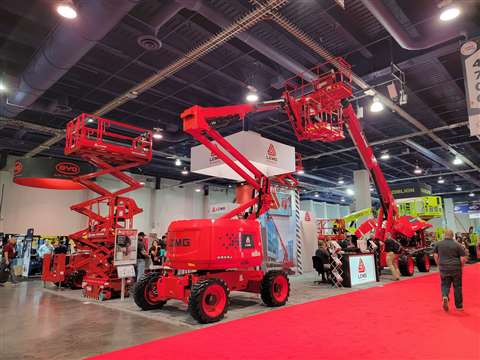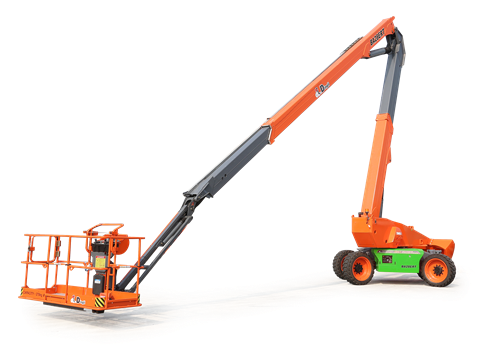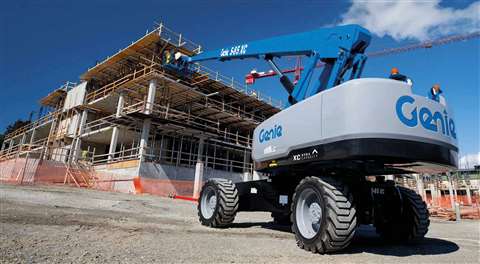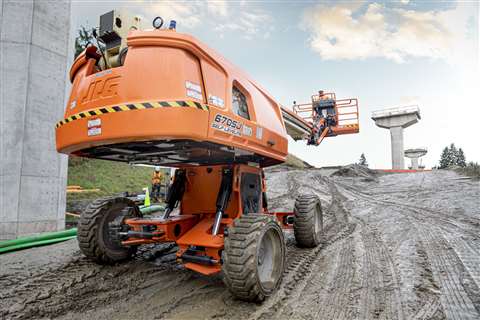U.S. announces tariff ruling on Chinese MEWP imports
21 October 2021
On Oct. 12, the U.S. Department of Commerce (DOC) reached a determination regarding its investigation into Chinese MEWP imports into the U.S., announcing import duties ranging from 12% to 488% should be imposed on Chinese imports.
Several Chinese suppliers responded to ALH in early November stating customers should not be limited in their choice of equipment manufacturers, whether domestically or internationally produced. Click here to read that story.
The next stage of the process will see the U.S. International Trade Commission (ITC) review the case and determine if the U.S. access manufacturing industry “has been injured as a result of dumped and/or subsidized imports.” The ITC will make a final determination on November 26.
 LGMG North America at the 2021 ARA Show.
LGMG North America at the 2021 ARA Show.
If the DOC finding is upheld, Chinese manufacturers could face a wide range of import duties depending on the extent of their trade and whether or not they participated in the investigation. LGMG could see a tariff of 18.34%, Dingli a duty of 11.95%, and all other OEMs a tariff of 12.9%. A small number of Chinese companies that declined to participate in the investigation would face rates of 448.70% (see below.)
The DOC investigation - which covers the 2020 calendar year - follows a petition filed in February by the Coalition of American Manufacturers of Mobile Access Equipment, comprised of JLG and Genie. They called for the U.S. government to investigate Chinese access equipment manufacturers selling equipment into the U.S. market at what they claimed were less-than-fair values.
According to an April 2021 ITC report, the Coalition argued that U.S. MEWP OEMs have “been injured as a result of dumped and/or subsidized imports” by “unfair pricing practices” from Chinese OEMs.
OEM arguments
Not all US manufacturers are supporting the Coalition. In submitted witness testimony to the U.S. International Trade Commission on Oct. 8, MEC’s Vice President of Sales Operations & Strategic Planning, Deanne Hix, stated, “Any economic injury that has been suffered by the domestic industry leaders, Genie and JLG, is not because of subject imports, but instead is the result of their approach to this industry.
“Over the course of years, Genie and JLG have made poor business decisions, prioritizing cutting costs and optimizing their stock prices rather than focusing on real investments in growth and product development and listening to the voice of the customers.
“They accelerated these cost-cutting measures during the Covid-19 pandemic, including temporary and permanent plant shutdowns, laying off hundreds of American workers. These under-investments in what grows a business are what have driven any loss in market share by Genie and JLG, not subject imports.”
 Dingli’s all-electric BA28ERT boom lift.
Dingli’s all-electric BA28ERT boom lift.
Hix went on to explain how MEC’s market position has grown in recent years because of the company’s “innovation and customer-driven approach to business expansion. As a small business in an industry where Genie, JLG and Skyjack dominate with 90 percent of market share, we do not have the luxury of making decisions that do not enhance our profitability…”
Additionally, Hix added, “But despite great product support and innovation, purchasing decisions often simply come down to good product availability. When customers have a need, they will look to who can fill it. By closing plants and reducing manufacturing capacity, Genie and JLG have extended their lead times, so the customers look to those who can fulfill their immediate needs.”
ALH has contacted Chinese OEMs for comment on the DOC finding.
Rental’s impact
The Coalition argued that Chinese producers were also “actively seeking additional inroads with some of the largest rental companies in the country” after establishing a presence in the U.S. with small‐ and medium‐sized companies. It noted that due to large rental companies’ national distribution networks, there is a “lower barrier to entry, that purchasers typically carry multiple brands, and the cost of switching or adding brands is minimal.”
However, Chinese respondents and MEC countered by stating that “the domestic industry myopically focused its customer base on large [rental companies] to its own detriment rather than also pursuing small and midsize equipment rental company customers.”
Chinese respondents also argued that the domestic access manufacturing industry’s “deteriorating performance during the period of investigation was due to declining demand for access equipment from large rental companies,” and claimed that corporate rental companies have “different purchasing behaviors than smaller rental agencies.”
Sinoboom said that large rental companies opted to “stretch the age of their current fleet and leverage existing inventory across their different stores” and purchased fewer assets due to the economic downturn related to Covid-19, while smaller rental outfits with smaller fleets were unable to do so, therefore demand for access equipment within the independent and smaller rental industry was stable throughout the downturn.
Chinese respondents also noted that small- to mid‐size rental companies were “looking for quicker, flexible and nimble supply that wasn’t tied to large national rental houses. These smaller rental houses struggled for attention and machine availability from many U.S. manufacturers in 2019 when industry was high.”
Values and views
ITC reported that Chinese MEWP imports were valued at US$176 million in 2018, $128 million in 2019 and $195 million in 2020, representing between 28,900 and 42,700 machines each year.
At The ARA Show (Oct. 18-20), Genie President Simon Meester told ALH, “I genuinely stand by and personally believe in global level playing fields, we believe strongly in free competition.
 Genie boom lift.
Genie boom lift.
“What we strongly oppose is that we’ve built an industry from the ground up over 55 years. We’ve invested hundreds and hundreds of millions of dollars in making this industry grow, invested a lot of money in creating jobs, American jobs.
“What we don’t support and strongly oppose is when dumping activities happen in our markets and are putting American jobs at stake, putting our investments at stake, and it’s just lose, lose proposition for everyone.”
During an investors call on April 28, Oshkosh (parent company of JLG) President and CEO John Pfeifer said, “We believe this is good for the long-term health of the industry… I’ll just highlight that fair competition, we’re open to fair competition. We always have been, and we always will be. And that keeps an industry competitive, and it keeps it vibrant. And I’m talking about equipment makers, rental companies and end users.
 JLG 670SJ self levelling boom
JLG 670SJ self levelling boom
“We have to continue to innovate for those rental companies and the end users, and innovation is the lifeblood of a healthy industry. And certainly, unfair trade practices undermine that. So the entire ecosystem would be harmed, if unfair trade practices are permitted to continue. And that’s why we stood up and said, ‘Hey, this unfair trade practice has to stop.’”
The Chinese companies who declined participation in the DOC investigation were Jinan Zhongtian International Trading, Zhongshan Shiliwang Machinery Co., Ltd, Yantai Empire Industry and Trade, Shandong Lede Machinery, Shandong Huifeng Auto Fittings, and Jinan Zhongtang Mechanical Equipment.
We will update this story as more information becomes available.
STAY CONNECTED



Receive the information you need when you need it through our world-leading magazines, newsletters and daily briefings.
CONNECT WITH THE TEAM








